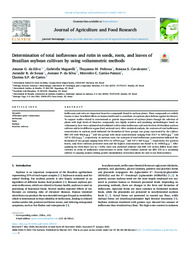Determination of total isoflavones and rutin in seeds, roots, and leaves of Brazilian soybean cultivars by using voltammetric methods.
Determination of total isoflavones and rutin in seeds, roots, and leaves of Brazilian soybean cultivars by using voltammetric methods.
Autoria: SILVA, J. G. da; MAGARELLI, G.; PEDROZA, T. M.; CAVALCANTE, R. S.; SOUZA, J. R. de; SILVA, J. P. da; CARRÃO-PANIZZI, M. C.; CASTRO, C. S. P. de
Resumo: ABSTRACT - Isoflavones and rutin are important bioactive compounds found in soybean plants. These compounds are widely known to have beneficial effects on human health and to contribute on soybean plant defense against herbivores.To support studies related to conventional or genetic improvement of soybean plants through the selection ofplants with high levels of bioactive compounds, two highly sensitive and promising methodologies based on voltammetry have been optimized and validated to determine isoflavones and rutin levels in 24 Brazilian soybean cultivars and in its different organs (leaf, seed and root). After statistical analysis, the contrasts of total isoflavones concentration in soybean seeds indicated the formation of three groups: one group represented by the cultivar BRS 133 with 902.6?gg-¹ and two groups with mean concentrations ranging from 313.7 to 529.0?gg-¹ and 127.5–233.5?gg-¹, respectively. In soybean roots, the contrasts of total isoflavones concentration indicated theformation of two groups ranging from 679.1 to 1470.6?gg-¹ and 137.1–447.9?gg-¹, respectively. For soybean leaves, only three cultivars presented rutin and the highest concentration was found to be 1438.8?gg-¹. After applying the Scott-Knott test (p<0.05), there was statistical evidence that BRS 133 variety differs from other varieties in terms of isoflavones concentration in seeds. Such evidence pointed out BRS 133 as a promising cultivar to ongoing projects aiming genetic manipulation of soybean plants for uses in soy food products.
Ano de publicação: 2021
Tipo de publicação: Artigo de periódico
Unidade: Embrapa Trigo
Palavras-chave: Brazilian cultivars, Differential pulse voltammetry, Isoflavones, Rutin, Soybeans
Observações
1 - Por padrão são exibidas publicações dos últimos 20 anos. Para encontrar publicações mais antigas, configure o filtro ano de publicação, colocando o ano a partir do qual você deseja encontrar publicações. O filtro está na coluna da esquerda na busca acima.
2 - Para ler algumas publicações da Embrapa (apenas as que estão em formato ePub), é necessário ter, no celular ou computador, um desses softwares gratuitos. Sistemas Android: Google Play Livros; IOS: iBooks; Windows e Linux: software Calibre.
Acesse outras publicações
Acesse a Base de Dados da Pesquisa Agropecuária (BDPA) para consultar o acervo completo das bibliotecas da Embrapa.

